Keystone XL pipeline

OF ALL THE unlikely battles still to be raging, the fight over the Keystone XL pipeline has to be about the unlikeliest.
It was a long shot in the summer of 2011, when the national fight really began. Though a hardy corps of ranchers in Nebraska were already battling, and though Indigenous activists in Canada had been spreading the word about its source in the tar sands, it was all but unknown on a national basis.
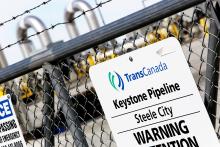
The Commission was tasked with determining whether the project is in the state's interest, but was prohibited from evaluating environmental issues because the pipeline already has an environmental permit.
Though the Obama administration rejected the project in 2015 on environmental grounds, President Trump reversed the decision in March 2017, saying the construction of the pipeline would produce increased jobs and decreased fuel prices. The reversal of the decision has been met with staunch opposition by those fighting for environmenal justice and indigenous rights.
3. March for Science. And Climate.
This weekend is the March for Science. Next week is the People's Climate March. LISTEN to our audio short, where we have a serious chat with scientists about religion. Then WATCH our video short, where we very non-seriously contemplate whom we might meet at the Climate March.

The State Department is set to approve the Keystone XL pipeline by Monday, Politico reports. The cross-border permit that will allow construction to proceed is set to be signed by Undersecretary for political affairs Tom Shannon just before the end of the 60-day timeline President Donald Trump called for in January.
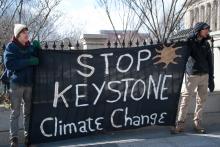
Tonight at 6:00, the Senate is holding a vote on the Keystone XL pipeline. I’ve been so excited lately by all the good thing happening in Congress, but this just might spoil my mood.
Here’s what has happened lately: President Obama met with Chinese President Xi Jinping, and the two of them agreed on a climate pollution-curbing deal. It’s a move that many people never thought possible, and it means big things for international climate talks. Also big news in that arena is Obama’s recent commitment of $3 billion to the Green Climate Fund, making us one of very few prosperous nations willing to help the world’s poor and vulnerable countries grapple with the climate impacts they are already facing – stronger storms, droughts that ravage subsistence farmers, rising sea levels that displace island nations. When the U.S. delegates show up at the U.N. climate talks in Lima two weeks from now, people might actually be happy to see us!
This week is an exciting one on the national level too. This afternoon at the EPA, a group of faith representatives will hand over our thousands of comments from people of faith who support the Clean Power Plan (and want to see the rule implemented well in every state).
But just when things were looking up, enter Congress. Here’s the basic scene:
Editor's Note: Want more ideas for how to celebrate Earth Week? Click here to sign up for Earth Week updates through Friday.
This week, we finally had some good news in the fight against climate change: President Barack Obama announced a further delay in the review process for the Keystone XL pipeline. The right thing to do is to reject the pipeline once and for all, but we all know politics is never that simple. The president says no decision will be made until the end of the year, which means the deadline comes after this year’s election. But the president isn’t up for re-election again, and protecting the environment should not be a partisan issue. All of us have a stake here.
We need more time, President Obama says, more reviews, more answers. But for Sojourners’ Rose Berger, who has been a leader in the faith community’s witness against Keystone XL, the answer has been clear for a long time.
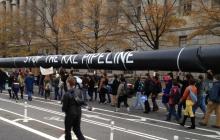
Friday at 3 p.m. ET, the State Department released their long-awaited final Supplemental Environmental Impact Statement of the Keystone XL pipeline extension, a proposed project from TransCanada to build a new pipeline for transporting tar sands crude oil from Canada to a refinery in Texas where it will likely be exported internationally.
Environmentalists and concerned citizens on the pipeline’s pathway have been waiting for the State Department to address previously ignored issues like the pipeline’s impact on climate pollution. President Obama said in a climate-focused speech last year that he would only approve Keystone XL if it did not pose a significant risk of climate pollution, so although State Department looked at other environmental risks as well (such as the 1,692 pipeline spills or incidents that occurred from 2002 to 2012 in the United States). This review concludes that the number of U.S. jobs to be created – once estimated in the tens of thousands – will actually be 50 operations jobs, with only 35 permanent. The rest (the touted 42,000 number) are all temporary construction jobs.
President Barack Obama revealed his approval of the Keystone XL pipeline project during his climate change speech on Tuesday. With the effort to reduce carbon pollution, Obama has agreed to move forward with the process providing that the Keystone XL pipeline doesn’t release an increasing amount of greenhouse gasses into the environment. The Hill reports:
“Our national interest will be served only if this project doesn't significantly exacerbate the problem of carbon pollution,” Obama said in speech laying out his second-term climate agenda, including greenhouse gas emissions for power plants.
“The net effects of the pipeline's impact on our climate will be absolutely critical to determining whether this project can go forward.”
Read more here.
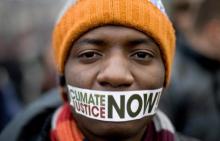
STATISTICALLY, the last couple of weeks of July are the hottest months of the year. In recent decades, the fossil fuel industry has been making them steadily hotter by burning huge amounts of coal, gas, and oil: Last year was by the far the warmest year in American history, and it came complete with biblical-scale fire, drought, and storm.
But this summer it’s the environmental movement that’s going to turn up the heat. Summer Heat is what folks are calling it: a collection of actions taking on the fossil fuel industry in every corner of the country.
Some of the action will stay focused on the route of the Keystone pipeline, but the emerging fossil fuel resistance is much broader than a single project: We’ll be at refineries and power plants and proposed coal ports, and we’ll be making clear that climate change is just part of the spectrum of damage that includes everything from air pollution to political corruption.
These battles have been led on the local level for years now by climate justice groups, by farmers and ranchers, by indigenous activists—by the folks on the frontlines of the damage from fossil fuels. But they deserve backup and reinforcement from the rest of us. And, of course, in an age of global warming, all of us are potentially on the front lines: Until Hurricane Sandy broke over their heads, most people in lower Manhattan thought the world was treating them pretty well.

A pipeline that will run from Canada, through the Midwest, and down to the Gulf Coast, the purpose of Keystone is to transport tar sands oil, which is more toxic than conventional oil, to ports where it can be processed and shipped overseas. In fact, the only oil that is guaranteed to stay in the U.S. is what will be spilled in communities and on farmlands. We saw this happen recently when a similar pipeline spilled in Arkansas. And, as for the promise of jobs, independent studies say fewer than 50 permanent jobs will be created by this project. Keystone is a deal in which America gets all the risk without any reward.
It's time for our leaders to take a stand and to stop supporting projects that only perpetuate our dependence on toxic, dirty sources of energy that contribute to climate change. But in the world of politics, it's not enough for something to be a moral imperative to get people to act. It is the nature of politics, and democracy, that our leaders respond when they feel the political pressure to do so. As people of faith, we have a powerful voice in our country. Keystone would not have been an issue in the Massachusetts Senate race if local religious communities had not made it clear that it is important.
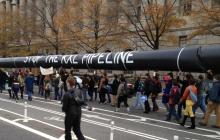
In the midst of our celebration of Earth Day, government agencies continued the debate over the Keystone XL Pipeline, which would transport oil from Canada’s tar sands across the United States into the gulf coast of Texas to be refined and shipped elsewhere. The State Department, tasked with reviewing the pipeline’s environmental impact, gave it a tentative pass a month and a half ago.
Activists across the country sprang into action to oppose the pipeline, citing its contribution to climate change and risk of oil spills. Supporters of the pipeline shot back, denying the climate impact of the pipeline and claiming that the oil would be produced whether or not the Keystone project moved forward.
The Environmental Protection Agency responded yesterday, calling into question the State Department’s findings and echoing the concerns of environmental activists everywhere: the Keystone Pipeline would be greatly exacerbate climate change.
Resources to help you join the battle to stop the construction of the Keystone XL pipeline
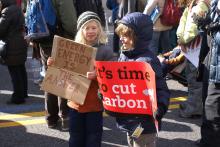
This past Sunday an estimated 35,000 people gathered in Washington, D.C., to push for legislative action in response to climate change. In addition to speaking out against the proposed Keystone XL pipeline, the “Forward on Climate” rally organizers urged President Barack Obama to limit U.S. greenhouse gas emissions and transition to larger levels of renewable energy. In addition to the mass assembly near the White House, environmental groups held similar rallies in cities across the nation, including a significant turnout in Los Angeles. All together, some have described the events of the past weekend as the largest collection of climate change rallies in U.S. history.
The president has recently emerged as a potentially strong ally in the struggle against climate change, for his inaugural address included a renewed commitment to environmental leadership, as he stated: "We will respond to the threat of climate change knowing that the failure to do so would betray our children and future generations.”
President Obama also addressed ecological concerns during his State of the Union speech, as he said: “We can choose to believe that Superstorm Sandy, and the most severe drought in decades, and the worst wildfires some states have ever seen were all just a freak coincidence. Or we can choose to believe in the overwhelming judgment of science – and act before it's too late." While conversation surrounding climate change was notably absent during his recent re-election campaign, the president appears to be making environmental concerns a top priority for his second term of office.
While President Obama seems to be a more visible environmental advocate, many are doubtful of his sincerity and question whether such statements are motivated by political calculation rather than genuine policy priorities. For example, in what can be described as a thought-provoking twist of irony, while thousands marched past the White House to move the president “Forward on Climate,” he was out golfing, which just so happens to be a sport that many environmentalists perceive as an ecological tragedy.
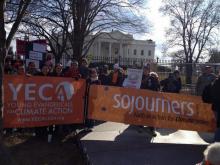
People of faith are in the 'miracle business.'
An estimated 200 people of faith gathered in Washington, D.C., on Sunday morning in preparation for the Forward on Climate Rally on the National Mall. The brief prayer service preceded the larger rally of an estimated 40,000 people urging President Barack Obama to take action against climate change and to reject the Keystone XL pipeline.
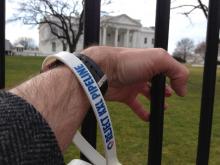
My wrist was cuffed to the White House fence next to the wrist of Robert F. Kennedy, Jr. Our nation’s chief climate scientist James Hanson stood next to me; Daryl Hannah sat in front of us. A few feet away, also cuffed to the fence, Julian Bond stood next to Bill McKibben and Michael Brune, Executive Director of the Sierra Club. Altogether, 48 of us from all over America obeyed our consciences. The days of safety and silence have ended. The time of pretending is over. Humanity will be held accountable for our desecration of creation. It is happening already.
And it was Ash Wednesday. When I mounted the platform to address the rally that preceded our civil disobedience, many were unaware that Lent was beginning. In the context of climate disruption, anyone who cares about creation can embrace the significance of Ash Wednesday. It’s a day of conscience, repentance, and conviction; a day when we take stock of our lives and our life together on the planet; a day when we confess our self-indulgent appetites, our intemperate love of worldly goods and comforts, and our obsession with consumption of every kind. For Christians, Ash Wednesday is a day to acknowledge that we are accountable to the God who gave us life and who entrusted the earth to our care.
Ash Wednesday is a good day to be arrested, I told the crowd. It’s a good day to realign our lives with God's desire to preserve this good creation. I invited any who wanted to receive ashes as a sign of their repentance to approach me on their way to White House.
One day after making climate change a key issue in his inaurugal address President Obama has decided to put off a decision on the Keystone XL Pipeline until April. The issue was thrust to the front of the agenda today when the governor of Nebraska approved the pipeline. The ultimate fate of the project is in Obama's hands. The Guardian reports:
Republicans immediately pushed Obama to approve the pipeline. "There is no bureaucratic excuse, hurdle or catch President Obama can use to delay this project any further," John Boehner, the Republican speaker of the House of Representatives, said in a statement. "He and he alone stands in the way of tens of thousands of new jobs and energy security."
Campaigners against the pipeline said Obama should immediately shut down the project. "Approving Keystone XL would make a mockery of the commitment he made at the inauguration to take action on climate change," said 350.org, which has led opposition to the pipeline.
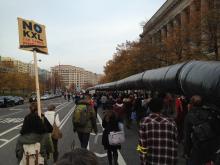
Midway through his nationwide, one-month Do The Math tour, Bill McKibben — author, environmental activist, and founder of 350.org — attracted a crowd that packed the Warner Theater in downtown Washington, D.C., on Sunday.
Joined both onstage and by video by a diverse group of speakers, including Rev. Lennox Yearwood of the Hip Hop Caucus, author Naomi Klein, and Archbishop Desmund Tutu, McKibben’s Do The Math tour brings to light the stark numbers of our current climate reality, first brought to the public’s attention in his viral article in Rolling Stone this past summer.
The three main numbers are as follows: 2 degrees Celsius is the maximum level of warming our planet can endure before real catastrophe occurs. To stay below 2 degrees C, we cannot burn more than 565 gigatons of carbon dioxide. But the problem is that the fossil fuel industry has 2,795 gigatons in their reserves — five times the safe amount to burn. As is their business plan, to reap the profit from these reserves, the fossil fuel companies plan on burning all of it, “unless we rise up to stop them” states the 350.org website.

The Nebraska state legislature on Wednesday approved a bill (LB1161) that will allow Nebraska to proceed with a $2 million study to find a route for TransCanada's proposed Keystone XL tar sands pipeline through the state. Gov. Dave Heineman is expected to sign the measure into law. But what does this mean?
It means a couple of things. First, it means that the global “people power” movement against the Keystone XL pipeline beat back the energy and oil industry in January when President Obama and the State Department denied TransCanada’s transnational permit. Our “united we stand” organizing strategy was effective. It forced the TransCanada to switch tactics. Now the oil industry is pushing a “divide and conquer” tactic. Its strategy is to break the pipeline up into state-sized parts and negotiate on each section. In Nebraska, new proposals to route the pipeline away from the environmentally sensitive Sandhills has removed a key political organizing tool from those of us who are working against the pipeline, especially in the Midwest.
Second, it means that Nebraska needs cash and will move forward to get it. Since the oil industry lobbyists have convinced the Obama administration to allow new routes to be proposed, Nebraska has leapt into the maneuvering space – in part to keep filling the state’s depleted coffers with funds from the TransCanada cash cow. The bill approved today will re-start the pipeline “review” process on the state level. And, the bill requires TransCanada to reimburse the state for the route study.

You've Heard Of Evangelicals, But Who Are They?; Radical Solutions To Economic Inequality; Playing Fair In Love And Climate Change; Jeremy Lin Says Faith In God Triggered 'Lin-Sanity'; 800,000 Americans Tell Senate: Stop The Keystone XL Pipeline; 5 Things You Might Have Missed In Obama's Proposed 2013 Budget; 'Plug In Better': A Manifesto; Render Unto Caesar; Are You A Real Christian?; Hundreds Rally Against Alabama Immigration Law.